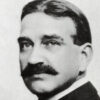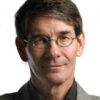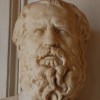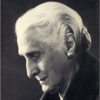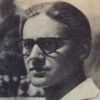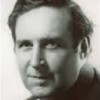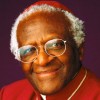THE DOCTOR: A straight line may be the shortest distance between two points, but it is by no means the most interesting.
Robert Holmes (1926-1986) British television screenwriter
Doctor Who (1963), 11×01 “The Time Warrior,” Part 1 (1973-12-15)
(Source)
Quotations about:
discovery
Note not all quotations have been tagged, so Search may find additional quotes on this topic.
GALILEO: The aim of science is not to open the door to everlasting wisdom, but to set a limit to everlasting error.
[Es ist nicht ihr Ziel, der unendlichen Weisheit eine Tiir zu offnen, sondern eine Grenze zu setzen dem unendlichen Irrtum.]
Bertolt Brecht (1898-1956) German poet, playwright, director, dramaturgist
Life of Galileo [Leben des Galilei], sc. 9 (1940) [tr. Sauerlander/Manheim (1955)]
(Source)
(Source (German)). Other translations:It isn't their [the sciences'] job to throw open the door to infinite wisdom but to put a limit to infinite error.
[tr. Willett (1980)]It is not the aim of science to open a door to infinite wisdom -- but to put an end to infinite error.
[tr. Brenton (1980)]
“Knowledge is what man is all about. People like you have tried to hold back progress since the beginning of time. But they failed, and you failed. Man needs to know.”
“Maybe,” Sanders said, “But is that the only thing man needs? I don’t think so. I think he also needs mystery, and poetry, and romance. I think he needs a few unanswered questions, to make him brood and wonder.”George R. R. Martin (b. 1948) American author and screenwriter [George Raymond Richard Martin]
“With Morning Comes Mistfall,” Analog (1973-05)
(Source)
Collected in Portraits of His Children (1987)
That Greek one then is my hero, who watched the bath water
rise above his navel and rushed out naked. “I found it,
I found it” into the street in all his shining, and forgot
that others would only stare at his genitals. What laughter!Daniel "Dannie" Abse (1923-2014) Welsh poet
Poem (1952), “Letter to Alex Comfort,” Walking Under Water
(Source)
Referring to Archimedes.
Some of my youthful readers are developing wonderful imaginations. This pleases me. Imagination has brought mankind through the Dark Ages to its present state of civilization. Imagination led Columbus to discover America. Imagination led Franklin to discover electricity. Imagination has given us the steam engine, the telephone, the talking-machine, and the automobile, for these things had to be dreamed of before they became realities. So I believe that dreams — day dreams, you know, with your eyes wide open and your brain machinery whizzing — are likely to lead to the betterment of the world. The imaginative child will become the imaginative man or woman most apt to create, to invent, and therefore to foster civilization. A prominent educator tells me that fairy tales are of untold value in developing imagination in the young. I believe it.
L. Frank Baum (1856-1919) American author [Lyman Frank Baum]
The Lost Princess of Oz, Introduction (1917)
(Source)
Again, we should notice the force, effect, and consequences of inventions, which are nowhere more conspicuous than in those three which were unknown to the ancients; namely, printing, gunpowder, and the compass. For these three have changed the appearance and state of the whole world; first in literature, then in warfare, and lastly in navigation: and innumerable changes have been thence derived, so that no empire, sect, or star, appears to have exercised a greater power and influence on human affairs than these mechanical discoveries.
[Rursus, vim et virtutem et consequentias rerum inventarum notare juvat; quae non in aliis manifestius occurrunt, quam in illis tribus quae antiquis incognitae, et quarum primordia, licet recentia, obscura et ingloria sunt: Artis nimirum Imprimendi, Pulveris Tormentarii, et Acus Nauticae. Haec enim tria rerum faciem et statum in orbe terrarum mutaverunt: primum, in re literaria; secundum, in re bellica; tertium, in navigationibus: unde innumerae rerum mutationes sequutae sunt; ut non imperium aliquod, non secta, non stella, majorem efficaciam et quasi influxum super res humanas exercuisse videatur, quam ista mechanica exercuerunt.]
Francis Bacon (1561-1626) English philosopher, scientist, author, statesman
Instauratio Magna [The Great Instauration], Part 2 “Novum Organum [The New Organon],” Book 1, Aphorism # 129 (1620) [tr. Wood (1831)]
(Source)
(Source (Latin)). Alternate translations:Again, it is well to observe the force and virtue and consequences of discoveries; and these are to be seen nowhere more conspicuously than in those three which were unknown to the ancients, and of which the origin, though recent, is obscure and inglorious; namely, printing, gunpowder, and the magnet. For these three have changed the whole face and state of things throughout the world; the first in literature, the second in warfare, the third in navigation; whence have followed innumerable changes; insomuch that no empire, no sect, no star seems to have exerted greater power and influence in human affairs than these mechanical discoveries.
[tr. Spedding (1858)]Again, it is well to mark the force, virtue, and consequences of discoveries; and these occur nowhere more manifestly than in those which were unknown to the ancients, and whose origin, though recent, is obscure and inglorious; the Arts, namely, of Printing, of Gunpowder, and the Mariner's Compass. For these three have changed the face and condition of things all over the world; the first in letters, the second in war, the third in navigation. And hence numberless changes have followed; so that no government, no sect, no star, seems to have exercised greater power and influence over human affairs than these mechanical discoveries.
[tr. Johnson (1859)]Again, it helps to notice the force, power and consequences of discoveries, which appear at their clearest in three things that were unknown to antiquity, and whose origins, though recent, are obscure and unsung: namely, the art of printing, gunpowder and the nautical compass. In fact these three things have changed the face and condition of things all over the globe: the first in literature; the second in the art of war; the third in navigation; and innumerable changes have followed; so that no empire or sect or star seems to have exercised a greater power and influence on human affairs than those mechanical things.
[tr. Silverthorne (2000)]Notice the vigour of discoveries, their power to generate consequences. This is nowhere more obvious than in three discoveries that the ancients didn’t know and whose origins (all quite recent) were obscure and humdrum. I am talking about the arts of printing, gunpowder, and the nautical compass. These three have changed the whole aspect and state of things throughout the world -- the first in literature, the second in warfare, the third in navigation -- bringing about countless changes; so that there seems to have been no empire, no philosophical system, no star that has exerted greater power and influence in human affairs than these mechanical discoveries.
[tr. Bennett (2017)]
A thought is often original, though you have uttered it a hundred times. It has come to you over a new route, by a new and express train of associations.
The world is a library of strange and wonderful books, and sometimes we just need to go prowling through the stacks.
Michael Dirda (b. 1948) American book critic
Book by Book: Notes on Reading and Life, ch. 8 (2005)
(Source)
Every human being, like every animal, wants to live in what is felt to be a safe environment — an environment where you won’t be exposed to unexpected peril. Now, when a man tells you that something you’ve always believed was in fact not true, it gives you a frightful shock and you think, “Oh! I don’t know where I am. When I think I’m planting my foot upon the ground, perhaps I’m not.” And you get into a terror.
Bertrand Russell (1872-1970) English mathematician and philosopher
Interview by Woodrow Wyatt, BBC TV (1959)
On resistance to scientific discovery.
Collected in Bertrand Russell's BBC Interviews (1959) [UK] and Bertrand Russell Speaks His Mind (1960) [US]. Reprinted (abridged) in The Humanist (1982-11/12), and in Russell Society News, #37 (1983-02).
If you do not expect the unexpected, you will not find it; for it is hard to be sought out and difficult.
[ἐὰν μὴ ἔλπηται ἀνέλπιστον οὐκ ἐξευρήσει, ἀνεξερεύνητον ἐὸν καὶ ἄπορον]Heraclitus of Ephesus (c.540-c.480 BC) Greek philosopher [Ἡράκλειτος, Herákleitos, Heracleitus]
Fragment 18 [tr. Burnet (1920), DK B18]
(Source)
(Source (Greek)). Alternate translations:He who does not expect will not find out the unexpected, for it is trackless and unexplored.
[tr. Kahn (1981), VI (D. 18)]He who does not expect the unexpected will not find it out.
[tr. Kahn (1981), VI (D. 18), variant]He who does not expect the unexpected will not find it, since it is trackless and unexplored.
[tr. Allan (2008)]Unless you expect the unexpected, you will not find it, for it is hidden and thickly tangled.
[tr. Jenks (2014)]
All my life through, the new sights of Nature made me rejoice like a child.
Marie Curie (1867-1934) Polish-French physicist and chemist [b. Maria Salomea Skłodowska]
Pierre Curie, “Autobiographical Notes: Marie Curie,” ch. 1 (1923) [tr. Kellogg/Kellogg]
(Source)
We must not forget that when radium was discovered no one knew that it would prove useful in hospitals. The work was one of pure science. And this is a proof that scientific work must not be considered from the point of view of the direct usefulness of it. It must be done for itself, for the beauty of science, and then there is always the chance that a scientific discovery may become like the radium a benefit for humanity.
Marie Curie (1867-1934) Polish-French physicist and chemist [b. Maria Salomea Skłodowska]
“The Discovery of Radium,” lecture, Vassar College (1921-05-14)
(Source)
Take then good note of it. Nothing is too small. I counsel you, put down in record even your doubts and surmises. Hereafter it may be of interest to you to see how true you guess. We learn from failure, not from success!
Abraham "Bram" Stoker (1847-1912) Irish author, theater manager, journalist
Dracula, ch. 10, Dr. Seward’s Diary, 7 September [Abraham Van Helsing] (1897)
(Source)
The prosperous fortunes, and the haughty wealth
Of an unrighteous man, we never ought
To deem establish’d on a solid base,
Or that the children of th’ unjust can prosper:
For Time, who from no Father springs, applies
His levell’d line, and shews man’s foul misdeeds.
[οὐδέποτ᾽ εὐτυχίαν κακοῦ ἀνδρὸς ὑπέρφρονά τ᾽ ὄλβον
βέβαιον εἰκάσαι χρεών,
οὐδ᾽ ἀδίκων γενεάν” ὁ γὰρ οὐδενὸς ἐχφὺς
χρόνος δικαίους ἐπάγων κανόνας
δείκνυσιν ἀνθρώπων καχότητας ἐμοί.]Euripides (485?-406? BC) Greek tragic dramatist
Bellerophon [Βελλεροφῶν], frag. 303 (c. 430 BC) [tr. Wodhull (1809)]
(Source)
Nauck (TGF) frag. 305, Barnes frag. 33, Musgrave frag. 6.
(Source (Greek)). Alternate translations:Think not that the prosperity and riches of the wicked can endure, nor yet the generation of the bad; for Time, sprung from eternity, having a just rule in his hand, shows the wickedness of men.
[Source (1878)]One ought never to imagine the success of a bad man, and his proud wealth, as secure, nor the lineage of unjust men; for time, which was born from nothing, adduces standards which are just and shows the wickedness of men in spite of all.
[tr. Collard, Hargreaves, Cropp (1995)]It must not be believed
that the wicked thrive securely
though puffed-up-proud in their prosperity
nor the long line of injustices go on and on
uninterrupted -- Self-generating Time
(slowly -- slowly) lays
the yardstick of justice --
into the open (at least) brings
all iniquities of men.
For all that. For all that.
[tr. Stevens (2012)]
Many shall run to and fro, and knowledge shall be increased
[Multi pertransibunt & augebitur scientia]
Francis Bacon (1561-1626) English philosopher, scientist, author, statesman
Instauratio Magna, Epigraph (1620)
(Source)
Somewhere, something incredible is waiting to be known.
Carl Sagan (1934-1996) American scientist and writer
(Spurious)
The words come from a profile of Sagan, "Seeking Other Worlds," Newsweek (15 Aug 1977). The final paragraph reads:“A serious search with negative results says something of profound importance,” Sagan argues. “We discover there’s something almost forbidden about life ... if it turns out we really are alone.” But clearly, Sagan is looking for a happier result. There may be no galumphing green Barsoomian giants to satisfy the fantasies of a romantic Brooklyn boy. But no doubt, there are even stranger discoveries to be made ... some totally new phenomenon perhaps ... Somewhere, something incredible is waiting to be known.
Those final words, not a quotation, have been broadly mistaken for an actual statement by Sagan.
Sharon Begley, one of the writers of the article, has confirmed the words are hers.
Sagan's daughter , Sasha Sagan, has also disavowed the quotation, noting that her father would never have used "incredible" in such a context, as the word literally means "not credible."
More discussion: Somewhere, Something Incredible Is Waiting To Be Known – Quote Investigator®.
A sin takes on new and real terrors when there seems a chance that it is going to be found out. This gives it a fresh and most substantial and important aspect.
Mark Twain (1835-1910) American writer [pseud. of Samuel Clemens]
“The Man That Corrupted Hadleyburg,” ch. 4 (1899)
(Source)
I am content to be one of the multitude of Christians who do not care much about the doctrine of the Trinity or the historical truth of the gospels. Both as a scientist and as a religious person, I am accustomed to living with uncertainty. Science is exciting because it is full of unsolved mysteries, and religion is exciting for the same reason.
Freeman Dyson (1923-2020) English-American theoretical physicist, mathematician, futurist
“Progress in Religion,” Templeton Prize acceptance speech, Washington National Cathedral (9 May 2000)
(Source)
The things which we understand least are the quasars, but I don’t want to get into a technical discussion. But these are the most violent and most energetic objects in the universe, and they’re totally, still totally, mysterious, really. I mean, we know that they’re there, that’s all, and they’re not only there, they’re rather frequent; and nobody ever dreamed that they existed, until they were found. And even after they were found it took a long time before people took them seriously. Nature’s imagination is always richer than ours.
Freeman Dyson (1923-2020) English-American theoretical physicist, mathematician, futurist
“Freeman Dyson: In Praise of Diversity,” Interview on A Glorious Accident, VPRO (Netherlands) (30 Aug 2016)
(Source)
There is an enormous variety of things we’ve discovered that we never dreamed of, like, for example, black holes, pulsars, quasars, all these unbelievably active goings-on in the universe. Which in Aristotle’s time the universe, the sky, was supposed to be quiescent, it was supposed to be perfect and peaceful, and nothing ever happened in the celestial sphere; and that remained true, actually, throughout all of the revolutions. It remained the general view of astronomers right through Copernicus, and Galileo, and Newton, and everybody else, still, the universe looked very quiescent — until just the last thirty years, and now we know it’s not like that at all. In fact the universe is full of violent events, and fantastic, strong gravitational fields, and collapsed objects, and huge outpourings of energy. All these things were discovered in the last thirty years.
Freeman Dyson (1923-2020) English-American theoretical physicist, mathematician, futurist
“Freeman Dyson: In Praise of Diversity,” Interview on A Glorious Accident, VPRO (Netherlands) (30 Aug 2016)
(Source)
The biggest breakthrough in the next 50 years will be the discovery of extraterrestrial life. We have been searching for it for 50 years and found nothing. That proves life is rarer than we hoped, but does not prove that the universe is lifeless.
Freeman Dyson (1923-2020) English-American theoretical physicist, mathematician, futurist
“Freeman Dyson forecasts the future,” New Scientist (15 Nov 2006)
(Source)
If every trace of any single religion were wiped out and nothing were passed on, it would never be created exactly that way again. There might be some other nonsense in its place, but not that exact nonsense. If all of science were wiped out, it would still be true and someone would find a way to figure it all out again.
Penn Jillette (b. 1955) American stage magician, actor, musician, author
“Passing Down the Joy of Not Collecting Stamps,” God, No!: Signs You May Already Be an Atheist and Other Magical Tales (2011)
(Source)
Only puny secrets need protection. Big discoveries are protected by public incredulity.
Marshall McLuhan (1911-1980) Canadian philosopher, communication theorist, educator
Take Today: The Executive as Dropout, ch. 2 (1972)
(Source)
People think that you have these things called ideas and that writing is a matter of imposing them on the subject material, whereas it’s only in the writing that I discover what it is that I think.
Anthony Lane (b. 1962) British journalist, film critic
“A Writer’s Life,” interview by Will Cohu, The Telegraph (14 Dec 2003)
(Source)
I want to tell people approaching and perhaps fearing old age that it is a time of discovery. If they say, “Of what?” I can only answer, “We must find out for ourselves, otherwise it wouldn’t be discovery.”
It is a mark of genius not to astonish but to be astonished.
Aubrey Menen (1912-1989) British writer, novelist, satirist, theatre critic
The Prevalence of Witches, ch. 4 (1947)
(Source)
I like handling newborn animals. Fallen into life from an unmappable world, they are the ultimate immigrants, full of wonder and confusion.
Diane Ackerman (b. 1948) American poet, author, naturalist
The Moon by Whale Light, ch. 4 “White Lanterns” (1991)
(Source)
Creativity is allowing oneself to make mistakes. Art is knowing which ones to keep.
Scott Adams (b. 1957) American cartoonist
Stick to Drawing Comics, Monkey Brain, Appendix B (2007)
(Source)
Youth finds no value in the views it disagrees with, but maturity includes discovering that even an opinion contrary to ours may contain a vein of truth we could profitably assimilate to our own views.
Sydney J. Harris (1917-1986) Anglo-American columnist, journalist, author
Pieces of Eight (1982)
(Source)
The only real argument for marriage is that it remains the best method for getting acquainted.
The Earth does not want new continents, but new men.
[Ce ne sont pas de nouveaux continents qu’il faut à la terre, mais de nouveaux hommes!]
Jules Verne (1828-1905) French novelist, poet, playwright
Twenty Thousand Leagues Under the Sea, Part 1, ch. 18 “Vanikoro” (1870) [tr. Smith & Co. (1873)]
(Source)
Ch. 19 in the French text.
Alt. trans.: "The planet doesn't need new continents, it needs new men." [Miller (1966)]
Keep on going, and chances are you will stumble on something, perhaps when you are least expecting it. I never heard of anyone stumbling on something sitting down.
Charles F. Kettering (1876-1958) American inventor, engineer, researcher, businessman
(Attributed)
Variant:"Keep on going and the chances are you will stumble on something, perhaps when you are least expecting it. I have never heard of anyone stumbling on something sitting down."
I am unable to find this precise phrase in Kettering's writings or primary writings about him. However, this appears to have been part of a common set of phrases he used, which indicates either it is accurate or a paraphrase of one of them:Accomplishment has been an accident as a rule. Nobody ever stumbled while he was standing still. You only stumble when you are moving. So we always had it a rule in our organization when we lacked intelligence we speeded up motion, because the chances of stumbling infinitely increased.
"250 at Luncheon Honor Kettering," New York Times (1936-11-11)Nobody ever found anything while sitting down. So, Q.E.D., don't be afraid to stumble.
“Don’t Be Afraid to Stumble,” The Rotarian (1952-01)
Now because 18 months ago the first dawn, three months ago broad daylight, but a very few days ago the full sun of the most highly remarkable spectacle has risen — nothing holds me back. I can give myself up to the sacred frenzy, I can have the insolence to make a full confession to mortal men that I have stolen the golden vessel of the Egyptians to make from them a tabernacle for my God far from the confines of the land of Egypt. If you forgive me I shall rejoice; if you are angry, I shall bear it; I am indeed casting the die and writing the book, either for my contemporaries or for posterity to read, it matters not which: let the book await its reader for a hundred years; God himself has waited six thousand years for his work to be seen.
Johannes Kepler (1571-1630) German astronomer
The Harmonies of the World [Harmonices Mundi], Book 5, Introduction (1618)
Alt. trans.:
- "It may well wait a century for a reader, as God has waited six thousand years for an observer." [in David Brewster, The Martyrs of Science; or, the Lives of Galileo, Tycho Brahe, and Kepler (1841)]
- "It may be well to wait a century for a reader, as God has waited six thousand years for an observer."
- "I feel carried away and possessed by an unutterable rapture over the divine spectacle of heavenly harmony ... I write a book for the present time, or for posterity. It is all the same to me. It may wait a hundred years for its readers, as God has also waited six thousand years for an onlooker." [in S Krantz and B Blank, Calculus: Multivariable (2006)]
- "I am stealing the golden vessels of the Egyptians to build a tabernacle to my God from them, far far away from the boundaries of Egypt. If you forgive me, I shall rejoice.; if you are enraged with me, I shall bear it. See, I cast the die, and I write the book. Whether it is to be read by the people of the present or of the future makes no difference: let it await its reader for a hundred years, if God himself has stood ready for six thousand years for one to study him."
In disputes upon moral or scientific points, ever let your aim be to come at truth, not to conquer your opponent: so you never shall be at a loss in losing the argument, and gaining a new discovery.
James Burgh (1714-1775) British politician and writer
The Dignity of Human Nature, Sec. 5 “Miscellaneous Thoughts on Prudence in Conversation” (1754)
(Source)
To hold the same views at forty as we held at twenty is to have been stupefied for a score of years, and take rank, not as a prophet, but as an unteachable brat, well birched and none the wiser. It is as if a ship captain should sail to India from the Port of London; and having brought a chart of the Thames on deck at his first setting out, should obstinately use no other for the whole voyage.
Robert Louis Stevenson (1850-1894) Scottish essayist, novelist, poet
Essay (1878-03), “Crabbed Age and Youth,” Cornhill Magazine, Vol. 37
(Source)
Collected in Virginibus Puerisque and Other Papers, ch. 2 (1881).
History, like beauty, depends largely on the beholder, so when you read that, for example, David Livingstone discovered the Victoria Falls, you might be forgiven for thinking that there was nobody around the Falls until Livingstone arrived on the scene.
Desmond Tutu (1931-2021) South African cleric, Anglican Archbishop of Cape Town, Nobel Laureate
“Fortieth Anniversary of the Republic,” speech (1981)
See Richard Cumberland.
These bare feet, these naked arms, these rags, these shades of ignorance, depths of despair, the gloom can be used for the conquest of the ideal. Look through the medium of the people, and you will discern the truth. This lowly sand that you trample underfoot, if you throw it into the furnace and let it melt and seethe, will become sparkling crystal; and thanks to such as this a Galileo and a Newton will discover the stars.
[Ces pieds nus, ces bras nus, ces haillons, ces ignorances, ces abjections, ces ténèbres, peuvent être employés à la conquête de l’idéal. Regardez à travers le peuple et vous apercevrez la vérité. Ce vil sable que vous foulez aux pieds, qu’on le jette dans la fournaise, qu’il y fonde et qu’il y bouillonne, il deviendra cristal splendide, et c’est grâce à lui que Galilée et Newton découvriront les astres.]
Victor Hugo (1802-1885) French writer
Les Misérables, Part 3 “Marius,” Book 1 “Paris in Microcosm,” ch. 12 (3.1.12) (1862) [tr. Wilbour/Fahnestock/MacAfee (1987)]
(Source)
The author speaking, criticizing philosophers and scholars who dismiss the common people, or "mob."
(Source (French)). Alternate translations:These bare feet, these naked arms, these rags, these shades of ignorance, these depths of abjectness, these abysses of gloom may be employed in the conquest of the ideal. This lowly sand which you trample beneath your feet, if you cast it into the furnace, and let it melt and seethe, shall become resplendent crystal, and by means of such as it a Galileo and a Newton shall discover stars.
[tr. Wilbour (1862)]These bare feet, these naked arms, these rags, this ignorance, this abjectness, this darkness, may be employed for the conquest of the ideal. Look through the people, and you will perceive the truth; the vile sand which you trample under foot, when cast into the furnace and melted, will become splendid crystal, and by its aid Galileo and Newton discover stars.
[tr. Wraxall (1862)]These bare feet, these bare arms, these rags, these ignorances, these abjectnesses, these darknesses, may be employed in the conquest of the ideal. Gaze past the people, and you will perceive truth. Let that vile sand which you trample under foot be cast into the furnace, let it melt and seethe there, it will become a splendid crystal, and it is thanks to it that Galileo and Newton will discover stars.
[tr. Hapgood (1887)]Those bare feet and arms, the rags, the ignorance, the abjection, the dark places, all may be enlisted in the service of the ideal. Peer through the heart of the people and you will discover the truth. The common sand that you tread underfoot, let it be cast into the furnace to boil and melt and it will become a crystal as splendid as that through which Galileo and Newton discovered the stars.
[tr. Denny (1976)]These bare feet, bare arms, rags, this benightedness, degradation, darkness may be used for the conquest of the ideal. Look through the populace and you will see the truth. This vile sand you trample underfoot -- let it be thrown into the furnace, let it melt and bubble there. It will turn into clear crystal, and it is thanks to this crystal that Galileo and newton will discover the stars.
[tr. Donougher (2013)]
The history of Western science confirms the aphorism that the great menace to progress is not ignorance but the illusion of knowledge.
Daniel J. Boorstin (1914-2004) American historian, professor, attorney, writer
Speech (1992-08-31), “Realms of Discovery, Old and New,” World Space Congress, Washington, D.C.
(Source)
Collected in his Cleopatra's Nose: Essays on the Unexpected, Part 1, ch. 1 "The Age of Negative Discovery" (1995).
In Carol Krucoff, "The 6 O'Clock Scholar," Washington Post (1984-01-29), he is quoted:The greatest obstacle to discovery is not ignorance -- it is the illusion of knowledge.
See Billings (1874).
The most exciting phrase to hear in science, the one that heralds new discoveries, is not “Eureka!” but “That’s funny…”
Isaac Asimov (1920-1992) Russian-American author, polymath, biochemist
(Attributed)
Unsourced. More information here.
No pessimist ever discovered the secrets of stars, or sailed to an uncharted land, or opened a new Heaven to the human spirit.





